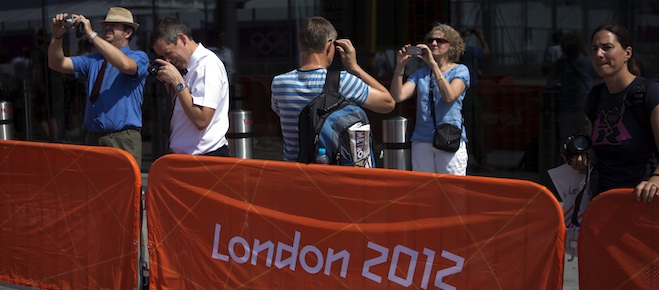An Olympic identity crisis
What we crave is not an amateur athletics event. What we crave is a reality show
People take photos of Olympic Park outside the security barricades in London, Thursday, July 26, 2012. Opening ceremonies for the 2012 Summer Olympics will be held Friday, July 27. (AP Photo/Emilio Morenatti)
Share

I hate to point this just as the show is about to begin, but the Olympic Games have an identity problem. Everyone thinks they’re an amateur athletics event. But that can’t be right.
The Olympic Games are not an amateur athletics event. They can’t be. Not for the obvious reason, though. The fact that professionals compete along with amateurs in the Games is a minor concern. This identity issue runs much deeper.
It’s a matter of definitions, expectations, contradictions. Paradoxes!
Think of it: an amateur athletics event would be ruined by perpetual cost overruns, construction delays, traffic, pollution and weather issues, ticket scandals, security boondoggles, sponsorship concerns, flag flaps and political snafus.
An amateur athletics event could never thrive, if the global media were hampered in their ability to report on it by a bewildering array of trademark-related legalities, seemingly intended to reduce your local news outlet to referring to the Games that Must Not Be Named.
How could an amateur athletics event continually survive doping, judging and sexual identity scandals?
No amateur athletics event could allow economic disparity between nations to determine the winners and the losers so predictably.
In an amateur athletics event, organizers would put fairness, first.
But the Olympic Games, despite their historic aura of sportsmanship, would be doomed by a level playing field.
Why? Well, the big rich countries wouldn’t like that, because as long as there have been Olympic Games, they’ve been an opportunity to show off the might of the mightiest nations. That’s why they pour their resources into their athletes, with patriotic programs like the arguably unsportsmanlike ‘Own The Podium.’
But we, the audience, might not be so fond of a level playing field either.
A level playing field, a true amateur competition, would mean we’d have to watch a bunch of unlovely, unheard-of people playing for unpopular countries, all vying for camera time with the gorgeous and talented and likeable American and British and Canadian athletes, not to mention their natural foils, the grim, governmentally-augmented automatons of Russia and China.
Of course, we’re not just patriots. We’re looking for the underdogs and the overlooked, the come-from-behinds and the too-far-in-fronts, hoping to find a human angle we can cling to, a hero we can believe in, a story that will sustain us.
Otherwise, we’re stuck with the most boring events of the Games: Medal-Counting, Chest-Beating, and that particular Canadian specialty, Bemoaning a Disappointing Performance.
But we want all of that depth and character played out within a carefully crafted scenario that’s bound to produce the kind of drama we love best; the kind that keeps us glued to our television and computer screens, the better to serve human curiosity, national pride and incidentally, the interests of the corporate sponsors and global media conglomerates who bring us the Games in the first place.
In other words, what we want, need, crave, is not an amateur athletics event. What we crave is a reality show. And that’s what the Olympics really is. Enjoy the show!